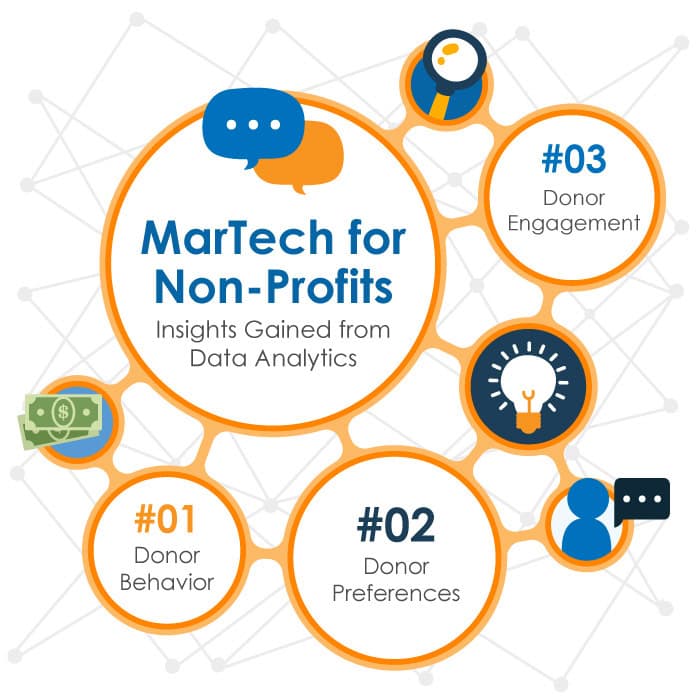
Non-profit organizations are a vital cornerstone of our society. Such institutions have existed since 1741, starting with the establishment of the Foundling Hospital in London, England. The hospital was followed 140 years later by the Red Cross (1881) and the YMCA (1884). These organizations are crucial for filling society’s gaps, such as providing essential services and advocating for social change. They stimulate economic growth, create jobs, and foster civic engagement. However, non-profits often face financial constraints and other challenges that impact their operations, but marketing technology (MarTech) offers new ways to address these issues.
Challenges Plaguing the Non-Profit Sector
Non-profits deal with multiple issues that corporate organizations and entrepreneurs manage to escape. Chief among these are the power to engage their communities effectively and to raise the necessary funds to support their activities. Addressing these challenges requires them to reach their audiences and engage meaningfully with stakeholders—both tall orders without modern technology. With budget constraints limiting the adoption of technologies, it’s often difficult for non-profits to communicate their missions, connect with potential donors, and mobilize much-needed support.
Making a Difference with MarTech
While implementing MarTech requires investment, as long as the non-profit can continue to raise funds, it can function and deliver the services the community needs. Statistics show donor behavior and engagement are evolving. While online giving is on the rise, capturing donors’ attention requires more personalized and engaging content than ever before.
With 84% of Millennials donating to charities, primarily online, and an average gift size of $481, the potential for digital engagement is clear. These trends underline the importance of addressing the dual challenges of engagement and fundraising by leveraging MarTech solutions to help bridge the gap between non-profits and their potential supporters.
The Potential of MarTech for Non-Profits
MarTech offers non-profits an opportunity to revolutionize their marketing strategies through digital transformation. Central to this transformation is the use of data analytics, which allows organizations to gain deep insights into donor behavior, preferences, and engagement patterns.

The Value of Data
Data analytics enable non-profits to segment their audience based on various criteria, ensuring that communications are tailored to different groups’ specific interests and needs. This level of personalization is critical in the modern digital environment, where donors expect organizations to understand their unique preferences and engage with them accordingly.
For instance, personalized email campaigns have been shown to increase open and click-through rates significantly, underscoring the effectiveness of targeted communications. Integrating MarTech tools also facilitates automated workflows, social media engagement, and dynamic content delivery, making it easier for non-profits to maintain consistent and meaningful interactions with their supporters.
By leveraging data-driven insights, non-profits can optimize their fundraising campaigns, enhance donor retention, and ultimately increase their impact.
Strategies for Fundraising
Non-profits can revamp their fundraising efforts with MarTech strategies that leverage digital technology and data analytics. Customized email campaigns allow organizations to tailor messages to specific groups within their audience based on interests, past donations, or engagement levels. This personalization leads to higher open rates and more successful fundraising outcomes.
Dynamic chatbots on websites and social media platforms offer another avenue for improvement. These chatbots can respond instantly to inquiries, guide donors through the donation process, and even solicit donations directly, creating a more engaging and user-friendly experience..
Overcoming Common Hurdles
Integrating MarTech solutions can present non-profits with hurdles, particularly budget constraints and skill gaps. We already know limited financial resources make investing in new technologies a challenge. In addition, an organization’s workforce might lack digital marketing, data analytics, and technology management skills, further complicating technology adoption.
To navigate these challenges, non-profits must focus on cost-effective, scalable MarTech solutions that offer the flexibility to adapt as their needs and capabilities grow. Prioritizing training and development is crucial, and investing in skill-building for current staff can make the tools more accessible and practical.
Partnerships with corporations or digital agencies can also offer non-profits access to expertise and technology. By leveraging such collaborations, non-profits can benefit from professional guidance, tailored strategies, and, sometimes, free or discounted services.
Lastly, adopting a phased approach to MarTech integration allows for gradual implementation. This strategy helps manage costs, reduces the risk of overwhelming the team, and ensures a smoother transition to new technologies.
Getting it Right: Bancroft School
Bancroft School, a New Jersey non-profit dedicated to assisting individuals with autism and other disabilities, successfully implemented Marketo and Salesforce to improve its database marketing strategies. With the assistance of GNW Consulting, the school personalized email campaigns based on data, resulting in a 15% increase in email engagement.

This success enabled the school to achieve 100% of its fundraising goals, aligning its digital efforts with its core mission to connect families with access to care. The organization cultivated stewardship and donations, empowering it to provide quality care and make a difference. Bancroft’s story shows how non-profits can leverage marketing technology to boost fundraising and community engagement.
Changing Obstacles into Opportunities
Non-profits today face complex challenges, but using MarTech strategies can lead to significant improvements, changing how organizations connect with people and raise funds. With the right MarTech tools, organizations can achieve and even surpass their goals, changing obstacles into opportunities for success. Non-profits should seriously consider using the digital tools available for a more compelling future.